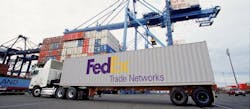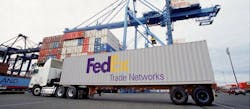In an effort to better understand what FedEx dubs “global purchasing behavior” in the e-commerce world, Forrester’s researchers polled over 9,000 people in 17 countries and territories, along with one-on-one interviews with small-and-medium businesses that maintain cross-border operations.
The need for the survey is pretty straightforward, noted Raj Subramaniam, FedEx’s executive VP for global marketing: online buying behavior currently represents over $1 trillion in annual sales and is forecasted to nearly double in the next four years.
Here are some of the report’s findings:
- Clothing and apparel are the most popular online purchase, along with books, electronics and cosmetics.
- Roughly 82% of global respondents report making an online purchase from a merchant outside their home country. These rates vary minimally across regions from a high of 90% of Canadians reporting purchasing cross-border compared to a low of 59% of Japanese. On average, online shoppers spend about $300 on cross-border items a year.
- The U.S., China and the U.K. are currently the top three exporters of online purchases. About 91% of Canadians in the survey reported making their cross-border purchases from the U.S, with Latin American shoppers sourcing from the U.S. as well, including 68% of Brazilians who responded.
- About 67% of US respondents indicated they buy items online at least once a month and a little over 30% say they make online purchases of goods from merchants outside their country at least every few months.
- Europeans have a tendency to order within the European Union, although U.K. businesses ship primarily to the U.S. and Australia. Shoppers in Japan and Korea stated they purchase more frequently from the U.S. than they do from their Asia-Pacific or “APAC” neighbors.
- Cross-border shoppers prefer to purchase from well-known major multi-brand retailers and global online marketplaces. In fact, the majority of respondents in every country surveyed ranked major multi-brand online retailers or marketplaces as their first choice out of five business types for cross-border purchases.
- While shipping cost and delivery time are top of mind with shoppers, over a third of global respondents cited high duties/taxes as a concern for cross-border shopping.
- The impact of duties and taxes was even more pronounced when researchers explored creating a standard “duty free” threshold. If all online purchases under US$200 were duty free, 56% of global respondents would increase their cross-border shopping.
- Regionally, this hypothetical “duty free” limit had the greatest impact on Latin American shoppers, with 80% of those respondents predicting an increase in their cross-border shopping. At the country level, 71% of respondents in India and 80% respondents in China indicated the same.
On a final note, FedEx’s survey found that 51% of Americans vs. 34% of global respondents stating it’s the availability of “specialty/hard to find items” as a reason for “cross-border shopping.”
Americans also indicated a greater interest in international cross-border shopping where the experience provided simple exchanges, guaranteed costs at check-out including duties and taxes, and free returns, the survey added.
In FedEx’s view, then, offering freight services that meet those more “specialized” e-commerce needs could witness strong growth in the near future. We’ll see how that develops.

